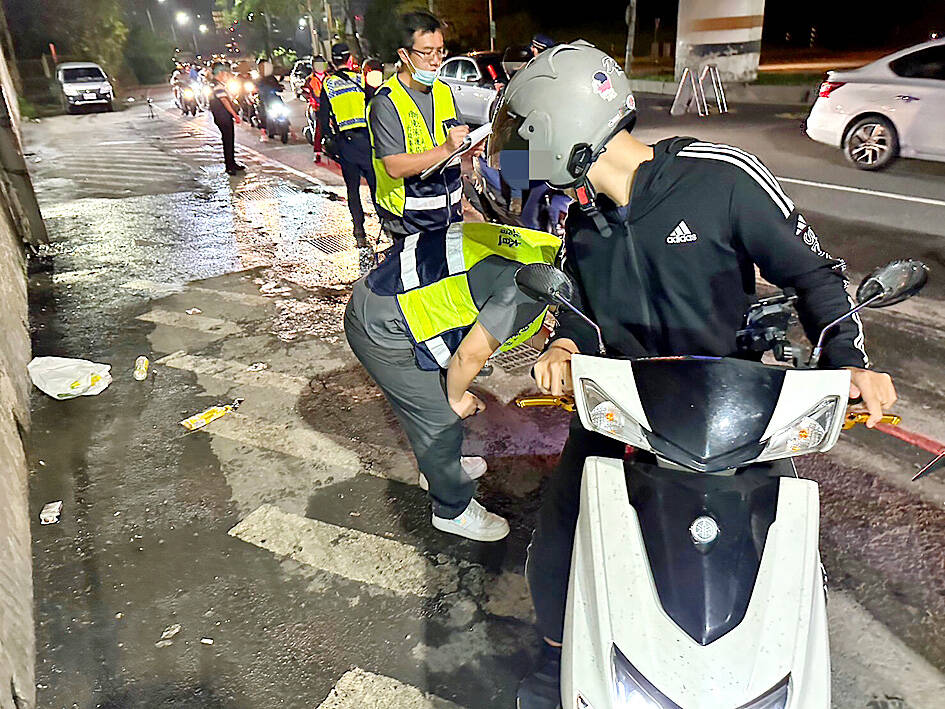The Ministry of the Environment is planning amendments to enforce mandatory noise certifications for vehicles’ modified exhaust systems by the end of the year.
A total of 23,423 complaints regarding noisy vehicles were filed this year as of August, and fines were imposed on 5,403 cases, the ministry said.
The numbers have surpassed the 21,682 complaints and 4,712 fines last year, it said.

Photo copied by Lin Chia-tung, Taipei Times
A woman surnamed Lee (李) said that noise from modified exhaust systems often wakes her up at night as she lives close to a major road, adding that she had to take sleeping pills and install airtight windows to improve her sleep.
A man surnamed Chen (陳) said he had been filing complaints regarding noisy vehicles for over a decade and hoped louder exhausts could be banned as they are “not a necessity.”
The noise from modified vehicles not only makes people irritable but also impairs hearing, he said.
The ministry’s Department of Atmospheric Environment Director-General Tsai Meng-yu (蔡孟裕) on Saturday said that the sound volume of general vehicles is about 80 decibels.
Noise exceeding 86 decibels made on roads with a speed limit of 50kph, or 90 decibels made on roads with a speed limit of 50 to 70kph, are considered illegal and owners could be fined up to NT$3,600, he said.
Environmental protection and police units enforcing the law and handling complaints failed to effectively curb noisy vehicle cases, Tsai said.
The current certification system for modified exhausts is unenforceable and it is not followed by all modified-vehicle owners, he said.
Noisy vehicles get fined when they are stopped for exceeding noise levels, Tsai said.
The ministry aims to introduce the “regulations governing certification of the modified exhaust” (改裝排氣管認證作業辦法) to make noise certification mandatory for vehicles with modified exhaust systems, he said.
The certification data would be linked to the vehicle registration data kept by the Ministry of Transportation and Communications, Tsai said.
Exhaust systems that are not legally certified would be in violation of the Road Traffic Management and Penalty Act (道路交通管理處罰條例) and face a fine of up to NT$1,800, he said.
Apart from modified exhaust systems, fines would also be given for noise generated by improperly modified engines and speeding, he said.
In July, the Environmental Protection Administration, which was upgraded to the Ministry of the Environment in August, increased the fines for noisy vehicles at night and around specific places such as schools, libraries and medical institutions, Tsai said.
Acording to the ammendment, modified vehicles above legal noise levels could face a fine up to NT$30,000; while unmodified vehicles surpassing noise limits could face a fine of NT$3,600, he said.

Three batches of banana sauce imported from the Philippines were intercepted at the border after they were found to contain the banned industrial dye Orange G, the Food and Drug Administration (FDA) said yesterday. From today through Sept. 2 next year, all seasoning sauces from the Philippines are to be subject to the FDA’s strictest border inspection, meaning 100 percent testing for illegal dyes before entry is allowed, it said in a statement. Orange G is an industrial coloring agent that is not permitted for food use in Taiwan or internationally, said Cheng Wei-chih (鄭維智), head of the FDA’s Northern Center for

LOOKING NORTH: The base would enhance the military’s awareness of activities in the Bashi Channel, which China Coast Guard ships have been frequenting, an expert said The Philippine Navy on Thursday last week inaugurated a forward operating base in the country’s northern most province of Batanes, which at 185km from Taiwan would be strategically important in a military conflict in the Taiwan Strait. The Philippine Daily Inquirer quoted Northern Luzon Command Commander Lieutenant General Fernyl Buca as saying that the base in Mahatao would bolster the country’s northern defenses and response capabilities. The base is also a response to the “irregular presence this month of armed” of China Coast Guard vessels frequenting the Bashi Channel in the Luzon Strait just south of Taiwan, the paper reported, citing a

UNDER PRESSURE: The report cited numerous events that have happened this year to show increased coercion from China, such as military drills and legal threats The Chinese Communist Party (CCP) aims to reinforce its “one China” principle and the idea that Taiwan belongs to the People’s Republic of China by hosting celebratory events this year for the 80th anniversary of the end of World War II, the “retrocession” of Taiwan and the establishment of the UN, the Mainland Affairs Council (MAC) said in its latest report to the Legislative Yuan. Taking advantage of the significant anniversaries, Chinese officials are attempting to assert China’s sovereignty over Taiwan through interviews with international news media and cross-strait exchange events, the report said. Beijing intends to reinforce its “one China” principle

A total lunar eclipse, an astronomical event often referred to as a “blood moon,” would be visible to sky watchers in Taiwan starting just before midnight on Sunday night, the Taipei Astronomical Museum said. The phenomenon is also called “blood moon” due to the reddish-orange hue it takes on as the Earth passes directly between the sun and the moon, completely blocking direct sunlight from reaching the lunar surface. The only light is refracted by the Earth’s atmosphere, and its red wavelengths are bent toward the moon, illuminating it in a dramatic crimson light. Describing the event as the most important astronomical phenomenon